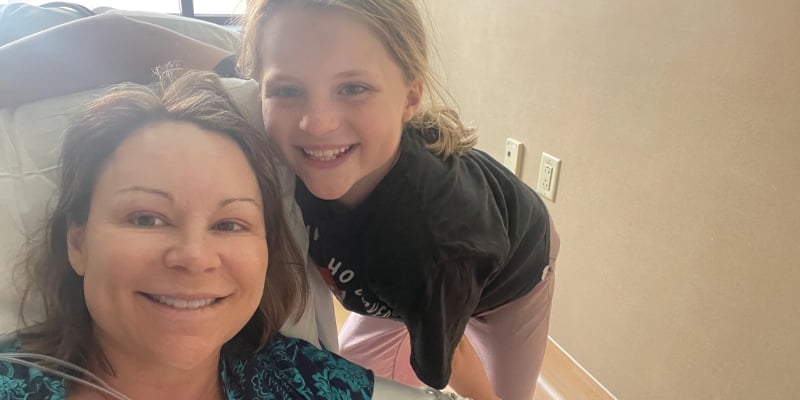While earning her PhD in Nursing Science at the University of Colorado College of Nursing at the CU Anschutz Medical Campus, Suzanne E. Courtwright, PhD (’21), MSN, PNP, received several awards and honors. Among them: the Dean’s Early Scholar Award (2017); the Joan Hess Scholarship Award (2018) and the Nancy Hester Scholarship Award (2020).
On February 2, 2023, Dr. Courtwright shared the findings from research funded by her 2021 Doris Kemp Smith Award. Named after a CU Nursing alumna, this award is given annually to faculty or PhD students at CU College of Nursing.
Focused on mental health and suicidal ideation among adolescents with chronic conditions, Courtwright’s lunch-hour presentation was part of CU College of Nursing’s PhD Intensives activities taking place throughout late January and early February.
“When 25% of our population under age 18 are having mental health and suicidal behaviors and ideation, we need to be concerned.” – Suzanne E. Courtwright, PhD (’21), MSN, PNP
Presentation takeaways
Courtwright’s presentation highlighted the critical challenges posed by the nationwide pediatric mental health crisis, and how those factors intersect with the children’s health system. She shared alarming and sometimes encouraging findings with participants:
-
Depression, anxiety, and suicide are major problems among adolescents; particularly for those with chronic conditions – Courtwright pointed out that while the rates of adolescents contemplating suicide fell to a low of 18% between 1991 and 2009, the rates began to rise again after 2009. “Of course, you’ve heard the news that those rates skyrocketed to 30% in the year 2020, so we certainly have a problem that we need to address,” Courtwright said. “The problem is significant, and it calls for a health systems approach.”
Courtwright noted that 25% of the country’s population is under the age of 18 and 40% of that population has chronic conditions that include asthma, congenital heart disease, Crohn’s disease, obesity, and other pediatric conditions that persist past adolescence.
“We know that adolescents with chronic conditions have quadruple the odds of committing suicide than their peers without chronic conditions,” she said. “So they certainly have special health needs that we need to recognize as we're looking at the mental health crisis across the country.”
-
The mental health crisis among this population is a serious cause for concern nationwide – Courtwright said the upsurge in suicide statistics raised red flags among pediatric practitioners and researchers.
“When 25% of our population under age 18 are having mental health and suicidal behaviors and ideation, we need to be concerned,” she said.
Courtwright noted that in May of 2021, the Children's Hospital Colorado declared a state of emergency after all access points across Colorado were overwhelmed with mental health diagnoses for teens.
“It was the first time any state in our nation had to declare a mental health crisis,” she said. “Six months later, the American Academy of Pediatrics, the American Academy of Child and Adolescent Psychiatrists, and the Children's Hospital Association, jointly declared a national state of emergency as the pandemic rolled on.”
-
Nurses and nurse practitioners need to play a larger role in addressing the mental health crisis – “From a nursing perspective, I'm looking at how do we mitigate the crisis and how do we also put systems in place where we can prevent this from happening?” Courtwright said. “I truly believe nurses have the power, and the skills, and the knowledge to be able to transform a trajectory for patients.”
Courtwright cited evidence that suggested that the characteristics and actions of nurses and nurse practitioners – and their relationships to patients – result in positive health and mental health outcomes.
“Healthcare provider relationships are very important for youth with chronic conditions,” she said. “Adolescents with higher chronic conditions have higher levels of health access and health literacy – simply because there's an assumption that if they have a chronic condition, they're already connected with the health system.”
A key component to identifying issues related to mental health is forming trusting relationships with these patients and asking the right questions, Courtwright said. She suggested that practitioners engage teenagers with “anticipatory guidance” through purposeful conversation that touches on personal issues at home and school.
Sadly, Courtwright’s research shows that one in five young people among this patient population have not yet formed a trusting relationship with their healthcare providers – making them less likely to identify their emotional and psychological struggles that might preclude suicidal ideation.
“Adolescents shared with me that they would not seek help until [depression or anxiety] was really, really bad,” she said.
Moving forward, Courtwright’s research will focus on the effect nurses have on mental health disparities and outcomes to measure emergency department visits, hospitalizations, and suicide-related behaviors.
“Countries across the world are now looking at our models of healthcare for nurse practitioners,” she said. “I believe that we have a role in this crisis we have now.”

PhD Intensives week guest speaker: Suzanne E. Courtwright, PhD (’21), MSN, PNP |
About Courtwright and her research
Having graduated from CU Nursing at Anschutz Medical Campus in 2021, Courtwright’s work is now funded as part of the National Institute of Nursing Research as a post-doctoral fellow at Columbia University School of Nursing in the Center for Healthcare Delivery Research and Innovation.
Her research questions draw from 20 years of clinical service as a pediatric nurse practitioner and nurse leader in urban children’s academic medical centers in New York City and Philadelphia.


